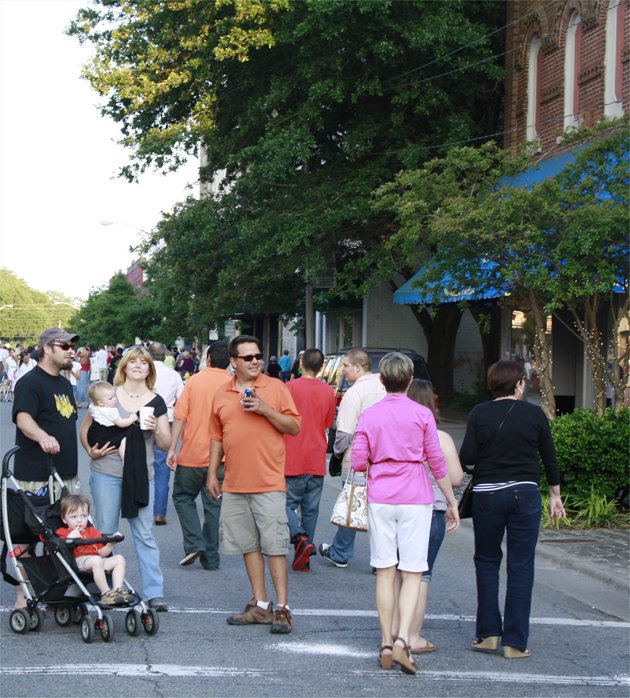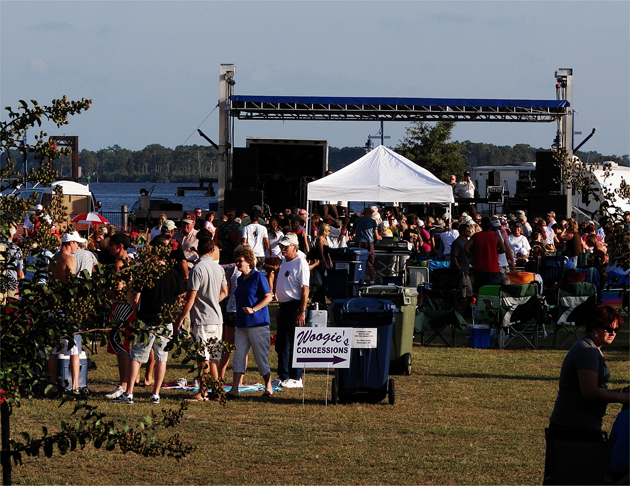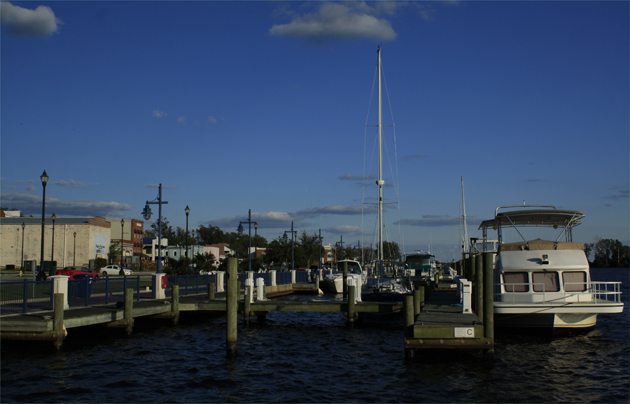Publisher's Note: This article originally appeared in the Beaufort Observer.
Commentary
Yesterday (12-2-11) we published a
news report from this month's Washington City Council meeting that every person interested in the future of this country, much less county and city, should take note of. The project should never even be allowed to take time in a future council meeting. Here's why.
The idea is to convert two unused buildings on Main Street into apartments for low income senior citizens. We think that is a great idea. We have no problem with the idea of development which brings more residents to the downtown area. That is the only hope for its future. There is currently an insufficient market to support much of what seeks to exist in the downtown area--witness the Turnage--and the only way to revitalize any downtown over time is to create the market.
 In front of the Louise Hotel during a Music in the Streets festival in May, 2011. Not pictured is the Turnage Theater just across the street. photo by Stan Deatherage
In front of the Louise Hotel during a Music in the Streets festival in May, 2011. Not pictured is the Turnage Theater just across the street. photo by Stan Deatherage
But the problem in reality is that if 70-80 seniors with incomes under $20,000 live downtown they are not likely to have enough discretionary income to support very many businesses downtown. They certainly are not going to pay the prices charged by the Turnage to view art events, or spend much in boutique shops. Dollar General perhaps, but most of these people will seek the least expensive products, not the trendy things.
So while the idea is good in theory, in reality it will never fly.
Well, having said that we wait for the liberal elite to explain how subsidies will make it viable. And that is the threat this project presents and that kind of thinking is exactly one of the major ills afflicting this nation today. The idea of "redistributing the wealth" by taking from producers and giving it to moochers is what we're talking about. It's the same idea that has led to the "Green Energy" scandals of the Obama Administration, such as Solyndra...and might we suggest, Invenergy (the Pantego Wind Farm). And yes, the Turnage as well. And spending a half million of taxpayer money to subsidize boat docks for the wealthy's boats can be included.
Here's the thing. Government has no right to take hard earned money from one set of taxpayers and give it to another group unless those footing the bill have equal access to the benefits of that expenditure. And those benefits should be direct, in proportion to the amount confiscated from the taxpayers.
Likewise, the government has no right to tax one set of businesses and give an unfair advantage to another business or special interest operation.
If the function is something that is not a basic government function, such a police, fire, EMS etc., then it should receive strict scrutiny and the government should have a compelling reason to enter into the deal. That "compelling reason" should be based upon the common good, not the good received by a select special interest. And that compelling reason should include: "Will it pay for itself over time?"
And if it is a proprietary venture it should be a good business deal.
A good rule of thumb is: The more the government subsidizes a proprietary (as opposed to basic government) function, the greater should be the number of people who have access to the project.
Here're a couple of applications of that principle.
It is completely legitimate for the city council to tax everyone to purchase a new fire truck, or a new garbage truck for that matter, if everyone has access to fire protection if they need it and everyone has access to garbage services, even regardless of the relative difference in use of the service.
 A crowd of Beach Music lovers at a Beach Music festival in Festival Park in September, 2010: Above. The public boat docks of the City of Washington in October, 2011. The rear of the former Louise Hotel is just to the left of the rear of the buildings shown: Below. photos by Stan Deatherage
A crowd of Beach Music lovers at a Beach Music festival in Festival Park in September, 2010: Above. The public boat docks of the City of Washington in October, 2011. The rear of the former Louise Hotel is just to the left of the rear of the buildings shown: Below. photos by Stan Deatherage

And it is legitimate for a municipality to tax everyone to provide non-essential services, such as parks and recreation, as long as everyone so taxed has equal access whether they choose to use the service or not. Thus, Festival Park is legitimate, but the docks (as reserved for lease holders) are not. The docks would be legitimate if anyone could use them on a first come, first served basis but not if they are reserved for a special interest group. Nonetheless, non-essential services are usually more appropriately funded by user fees than general taxation.
But the main criterion that should be used in evaluating such projects as this housing project is "Return on Investment."
Regardless of the principle, this project is a bad business deal. This company is proposing to spend $9.5 million on 59 apartments. That's over $160,000 per unit for one or two bedroom apartments. And the revenue (rents) will never, ever pay for them, or possibly even maintain them adequately.
That's the key issue we think. What will be the legitimately documented "spillover" impact of the project? We don't know. And we don't think the City knows, and if Landex knows, they did not present any real data-based evidence of the spillover effect. It is all anecdotal evidence at this point.
Some subsidized low income housing projects work beautifully. Others are miserable flops, causing more negative effects than positive. "There goes the neighborhood..." has become a cliché from such projects.
What the research we've seen tends to say is: Low income subsidized housing is neither good nor bad per se. It depends of the individual situation.
Thus, we think the City of Washington should gather some solid information and evidence before it ventures into this project. We were very impressed with the abstract idea presented by Landex, but not at all by the specificity of their data. But that is exactly what the decision should turn on. Solid data. Data that shows what the Return on Investment will be.
How much will this project impact other property values downtown? How much economic impact will the residents have on downtown? Will the property values downtown be increased enough to pay for the city's expense? Conversely, what is the probability that the project will lower property values? How will the taxpayers' investments be collateralized? Who will manage/oversee the construction expenditures? And we suspect there is a host of other questions we don't know enough to ask.
This is a business deal. Before the City enters into any such business deal it should carefully evaluate it to ascertain that it is fundamentally sound in principle and solid as business deal. That remains to be seen in this instance.
And the absolute last thing the City should do is rush to judgment, as Councilman Doug Mercer cautioned them.
But the bottom line in all this goes back to the fundamental principle involved: If this project is going to be implemented, it should pay for itself and that includes the grants and tax credits. It should increase tax values and commerce downtown enough to increase revenue to offset the costs to the general taxpayers.
























